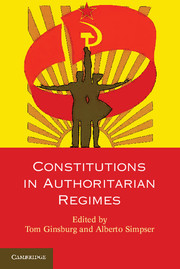1 - Introduction
Constitutions in Authoritarian Regimes
Published online by Cambridge University Press: 05 June 2014
Summary
An old Soviet joke has it that a man goes into a restaurant and surveys the menu. “I’ll have the chicken,” he says, only to be told by the waiter that the restaurant is out of chicken. He asks for the beef, only to be told the same thing. Working his way through the menu, he is repeatedly told that the restaurant is out of the selected dish, until he gets upset and says, “I thought this was a menu, not a constitution.” The joke captures the usual perception of dictatorial constitutions as meaningless pieces of paper, without any function other than to give the illusion of legitimacy to the regime.
But this view raises a puzzle. Formal written constitutions are ubiquitous features of modern nation-states and are found as often in autocracies as in democracies. Furthermore, they are costly to adopt, consuming significant political energy and time. Stalin, along with many Soviet elites, played a direct role in drafting the 1936 Constitution and took the process quite seriously (Getty 1991: 22). The seventeen years required to draft the recent constitution of Myanmar may have been exceptional, but there is no doubt that some authoritarians spend political effort on constitution making. Why would they bother to do so if the documents are meaningless? The standard answer that the constitution is a legitimating device begs the question: How can an obvious sham document generate any legitimacy?
- Type
- Chapter
- Information
- Constitutions in Authoritarian Regimes , pp. 1 - 18Publisher: Cambridge University PressPrint publication year: 2013
References
- 2
- Cited by



